(管理学)management4
- 格式:ppt
- 大小:491.00 KB
- 文档页数:23
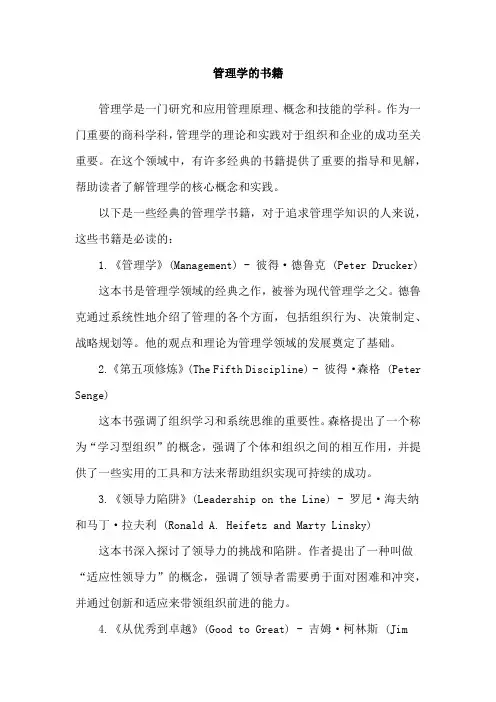
管理学的书籍管理学是一门研究和应用管理原理、概念和技能的学科。
作为一门重要的商科学科,管理学的理论和实践对于组织和企业的成功至关重要。
在这个领域中,有许多经典的书籍提供了重要的指导和见解,帮助读者了解管理学的核心概念和实践。
以下是一些经典的管理学书籍,对于追求管理学知识的人来说,这些书籍是必读的:1.《管理学》(Management) - 彼得·德鲁克 (Peter Drucker)这本书是管理学领域的经典之作,被誉为现代管理学之父。
德鲁克通过系统性地介绍了管理的各个方面,包括组织行为、决策制定、战略规划等。
他的观点和理论为管理学领域的发展奠定了基础。
2.《第五项修炼》(The Fifth Discipline) - 彼得·森格 (Peter Senge)这本书强调了组织学习和系统思维的重要性。
森格提出了一个称为“学习型组织”的概念,强调了个体和组织之间的相互作用,并提供了一些实用的工具和方法来帮助组织实现可持续的成功。
3.《领导力陷阱》(Leadership on the Line) - 罗尼·海夫纳和马丁·拉夫利 (Ronald A. Heifetz and Marty Linsky) 这本书深入探讨了领导力的挑战和陷阱。
作者提出了一种叫做“适应性领导力”的概念,强调了领导者需要勇于面对困难和冲突,并通过创新和适应来带领组织前进的能力。
4.《从优秀到卓越》(Good to Great) - 吉姆·柯林斯 (JimCollins)这本书研究了一些在业务上取得长期成功的公司,并分析了它们的共同特点。
柯林斯提出了一些关于领导力、组织文化和战略规划的重要观点,帮助读者了解如何将一家普通公司变成卓越的企业。
5.《创新者的窘境》(The Innovator's Dilemma) - 克莱顿·克里斯坦森 (Clayton Christensen)这本书探讨了企业在创新过程中面临的困境。
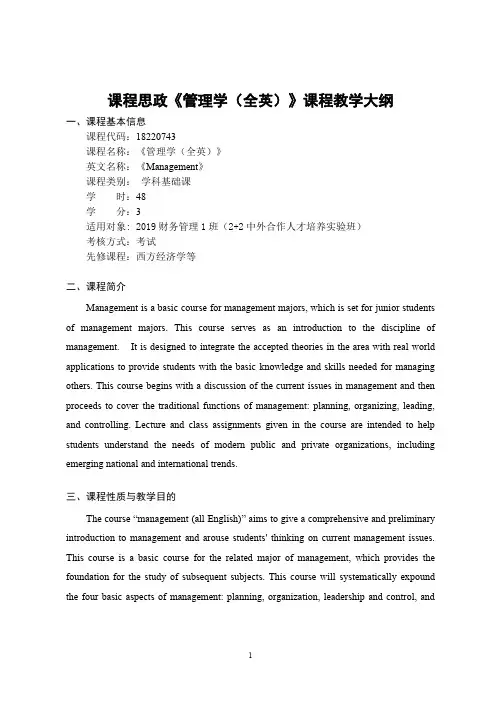
课程思政《管理学(全英)》课程教学大纲一、课程基本信息课程代码:18220743课程名称:《管理学(全英)》英文名称:《Management》课程类别:学科基础课学时:48学分:3适用对象:2019财务管理1班(2+2中外合作人才培养实验班)考核方式:考试先修课程:西方经济学等二、课程简介Management is a basic course for management majors,which is set for junior students of management majors.This course serves as an introduction to the discipline of management.It is designed to integrate the accepted theories in the area with real world applications to provide students with the basic knowledge and skills needed for managing others.This course begins with a discussion of the current issues in management and then proceeds to cover the traditional functions of management:planning,organizing,leading, and controlling.Lecture and class assignments given in the course are intended to help students understand the needs of modern public and private organizations,including emerging national and international trends.三、课程性质与教学目的The course“management(all English)”aims to give a comprehensive and preliminary introduction to management and arouse students'thinking on current management issues. This course is a basic course for the related major of management,which provides the foundation for the study of subsequent subjects.This course will systematically expound the four basic aspects of management:planning,organization,leadership and control,andwill try to apply the theory into case analysis under the guidance of teachers.At the end of the course,students should be able to analyze problems in the management field from a more professional perspective and master common technical terms in the field.Due to the basic course of management,the study of this course also lays a foundation for the subsequent study of related courses,such as strategic management,human resource management,e-commerce,organizational behavior,etc.This course uses English textbooks and the classroom language is English.Therefore,it has a higher requirement for the teaching object.Students should generally have a high level of English,and have strong oral English ability.Through the study of this course,four teaching objectives can be achieved:1.The construction of management knowledge system:to enable students to master thebasic concepts and connotations of management,various management theories, knowledge construction and curriculum system construction.2.The improvement of various skills:to enable students to think and analyze themanagement phenomenon in today's business environment with all kinds of knowledge, and break through traditional knowledge to achieve thinking innovation.3.The improvement of English listening,speaking,reading and writing ability:as thiscourse is an all-English teaching form,it will have requirements on students'English skills in all aspects.4.The strengthening of ideological and political education:to enable students tocomprehensively and objectively understand contemporary China and look at the outside world,be good at distinguishing right from wrong,and form a stand,viewpoint and method for observing and understanding contemporary world and contemporary China.四、教学内容及要求Chapter1The introduction of management:history,concepts and framework Chapter main Contents:1.Tell who managers are?2.What three characteristics do all organizations share?3.What’s the definition of management?4.Make comparison between managers and non-managerial employees.5.Three ways to look at what managers do.6.Explain why it’s important to study management.7.Describe the factors that are reshaping and redefining management.8.Scientific Management,General Administrative Theory,Behavioral Approach,Systems Approach.Chapter Objectives:Emphasis:1.Understand three Common Characteristics of Organizations.2.what’s the difference between Managers and non-managerial Employees?Difficulties:what does a manager do?Elements of ideological and political education:patriotismChapter Assignments:Please list at least three kinds of job titles in modern company and attribute these titles to four management levels.Chapter2The management environment analyses and applicationChapter main Contents:1.Explain what the external environment is and why it’s important?2.Discuss how the external environment affects managers?3.Define what organizational culture is?4.Describing the dimensions of organizational culture.5.How organizational culture affects managers?Chapter Objectives:Emphasis:what does external environment include?And how these factors affect the management?Difficulties:know the organizational culture?And how to evaluate an organization’s culture?Elements of ideological and political education:an international visionChapter Assignments:Please select one industry you are interested in and make the analyses about it’s external environment?Chapter3Integrative managerial issuesChapter main Contents:1.How to understand the concept of“globalization”and its reflection.2.What’s the influence of globalization on organizations?3.How organizations go global?And what are the different types of globalorganizations?4.What managers need to know about the management in global business?5.Discuss how society’s expectations are influencing managers and organizations.6.Discuss the factors that lead to ethical and unethical behavior in organizations.7.Describe how the workforce is changing and its impact on the way organizations aremanaged.Chapter Objectives:Emphasis:1.The meaning of globalization and it’s effect on management2.the diversity of workforceDifficulties:understanding the effect of firm globalization on company management.Elements of ideological and political education:an holistic viewChapter Assignments:Please conclude the effects of globalization effects on company management.Chapter4Foundation of decision makingChapter main Contents:1.Describe the decision-making process and some points about every step.2.What common errors are committed in the decision-making process?(12commondecision errors)3.Explain the three approaches managers can use to make decisions.4.Describe the types of decisions and decision-making conditions managers face.5.Discuss group decision-making,knowing the advantage and disadvantage of groupdecision making.6.When are groups most effective?7.Discuss contemporary issues in managerial decision making(national culture,creativity and design thinking,big data)Chapter Objectives:Emphasis:The three levels of analysis in the OB model.Difficulties:The need for a contingency approach to the study of OB.Elements of ideological and political education:socialism with Chinese characteristicsChapter Assignments:Think over whether you have made some errors in decision making?What’s it?Chapter5Foundation of planningChapter main Contents:1.Discuss the nature and purposes of planning?2.Since changing is ever-stopping,is the formal planning necessary?3.Explain what strategic includes and what managers do in the strategic managementprocess?4.What strategies do mangers use?pare approaches to goal setting and planning.6.How do managers set goals and develop plans?7.What contemporary issues in planning do managers face?Chapter Objectives:Emphasis:1.The company strategy system2.The content of MBO3.The steps and methods of goal-settingDifficulties:1.The essence of MBO2.The company strategy systemElements of ideological and political education:confidence in our path,in our theoriesChapter Assignments:If“The don’t change thing is change itself”is the real fact,what’s the meaning of planning?Chapter6Organizational structure and designChapter main Contents:1.What are the six key elements in organizational design?(specialization,departmentalization,authority,span of control,centralization,formalization)2.Identify the contingency factors that favor either the mechanistic model or theorganic model of organizational design.pare traditional and contemporary organizational designs.4.Discuss the design challenges faced by today’s organizations.(keep employeesconnected,global difference,building a learning organization,flexible workarrangement and so on)Chapter Objectives:Emphasis:The six key elements in organizational design.Difficulties:The design challenges faced by today’s organizations.Elements of ideological and political education:confidence in our systemChapter Assignments:Do you think the traditional hierarchical structure still have life today? Chapter7Managing human resourcesChapter main Contents:1.Describe the key components of the human resource management process andthe important influences on that process.2.What’s employment planning?And what’s the two steps of it?3.How do organizations recruit employees?And how to handle layoffs?4.How do managers select competent employees?5.What is employees are provided with needed skills and knowledge?6.Describe strategies for retaining competent,high-performing employees.7.Discuss contemporary issues in managing human resources.Chapter Objectives:Emphasis:1.The process of human resource management;2.How to compensate the employees;3.How to retain competent,high-performing employees.Difficulties:Grasping the process of HRM and how to match the job requirements and employee?Elements of ideological and political education:China’s national conditionChapter Assignments:How to retain the90s and00s employees?Chapter8Managing change and innovationChapter main Contents:1.Define organizational change and the categories of organizational change.2.what forces lead to organizations make change?pare the change process.(CALM WATERS VS.WHITE-WATERMETAPHOR)4.what forces resist the organization change?5.Explain how to manage resistance to change?6.What managers need to know about employee stress?7.Discuss techniques for stimulating innovation.Emphasis:1.What’s organizational change are companies confronted with?2.What can the companies do to eliminate the employees’stress?3.How to create innovation?Difficulties:What can companies do to make the organization more creative?Elements of ideological and political education:a sense of prideChapter Assignments:1.What method do you know about prompting one more creative?2.Do you have some method to decrease the stress?Chapter9Group and managing work teamsChapter main Contents:1.What’s the definition of group and what are the stages of group development?2.Describe the five major concepts of group behavior.(roles,norms andconformity,status systems,group size,group cohesiveness)3.How groups are turned into effective teams?From context,composition,workdesign and process perspectives.4.What contemporary issues do managers face in managing teams?(managingglobal team,)Chapter Objectives:Emphasis:1.how to build an effective work team?2.what issues does a manager must confronted with in new environments?Difficulties:How to build an effective work team?Elements of ideological and political education:organization confidenceChapter Assignments:Do you want to work in team or work individually?Why?Chapter10Motivating and rewardingChapter main Contents:1.Define and explain motivation and what’s three elements of motivation?pare four early theories of motivation(Maslow’s Hierarchy of NeedsTheory,X-Y Theory,Two-Factor Theory,McClelland’s Three-needs Theory)3.What’s goal-setting theory?4.How does job design influence motivation?5.What’s equity theory?6.What current issues do managers face in motivating employees?Chapter Objectives:Emphasis:Compare and integrate the classical and modern motivation theoryDifficulties:How to apply these motivation theories to realities?Elements of ideological and political education:responsibilityChapter Assignments:What factors can motivate you working harder?Chapter11Leadership and trustChapter main Contents:1.Who is leader and what is leadership?2.What traits do leaders have according trait theory?3.What behaviors do leaders exhibit?4.Describe the four major contingency leadership theories.5.Describe modern views of leadership and the issues facing today’s leaders.6.Why trust is the essence of leadership?Chapter Objectives:Emphasis:How to understand the contingency leadership theory?Difficulties:How to understand the essence role of trust in leadership?Elements of ideological and political education:integrity and honestyChapter Assignments:Imaging you are a leader,what do you want to do to build the trust relationship with employees?Chapter12Managing communication and informationChapter main Contents:1.Describe what managers need to know about communicating effectively.2.Explain how technology affects managerial communication.3.Discuss contemporary issues in communication.Chapter Objectives:Emphasis:1.What’s the process of communication?paring written communications and verbal communication.3.Which factors will lead to the ineffectiveness in communication?4.How to enhance the communication effect?5.Understanding the effects of some technology on managing communication.6.What communication issues do managers face today?Difficulties:How to tackle the resistance when communication?Elements of ideological and political education:development and innovationChapter Assignments:Please recall the last low-efficient communication case in your daily life and analyze the reason.Chapter13Foundation of controlChapter main Contents:1.What is control and why control is important?2.Describe the three steps in the control process.(get measuring,compare actualperformance to planned goals,take actions)3.When does control take place?4.Discuss the types of controls organizations and managers use.5.What contemporary control issues do managers confront?Chapter Objectives:Emphasis:Grasp three kinds of control.Difficulties:When does control take place?Elements of ideological and political education:ideal and faithChapter Assignments:Which method do you think is most effective when controlling?why?五、各教学环节学时分配Presentation and debate033 Chapter9Group and managing work teams33 Chapter10Motivating and rewarding(I)33 Chapter10Motivating and rewarding(II)213 Chapter11Leadership and trust33 Chapter12Managing communication and213 informationChapter13Foundation of control33 Review and answering033六、推荐教材和教学参考资源1、《21世纪的管理挑战》,彼得.德鲁克著2、《创新者的窘境》&《创新者的解答》,克莱顿•克里斯坦森著3、《竞争战略》迈克尔.波特著4、《影响力》罗伯特.西奥迪尼著5、《定位》艾·里斯,杰克·特劳特著6、《商战》杰克•特劳特/阿尔•里斯著7、《联盟:互联网时代的人才变革》里德·霍夫曼著8、《重新定义管理》布赖恩·罗伯逊著七、其他说明大纲修订人:田野修订日期:2020/12/10大纲审定人:赵明审定日期:2020/12/16。
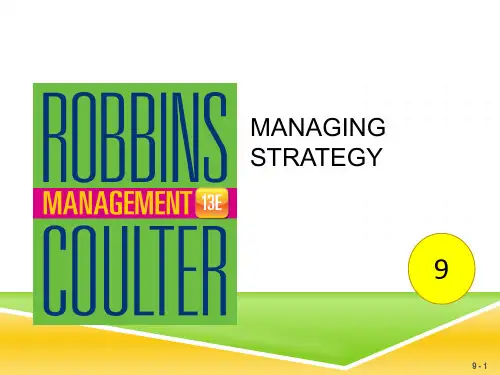
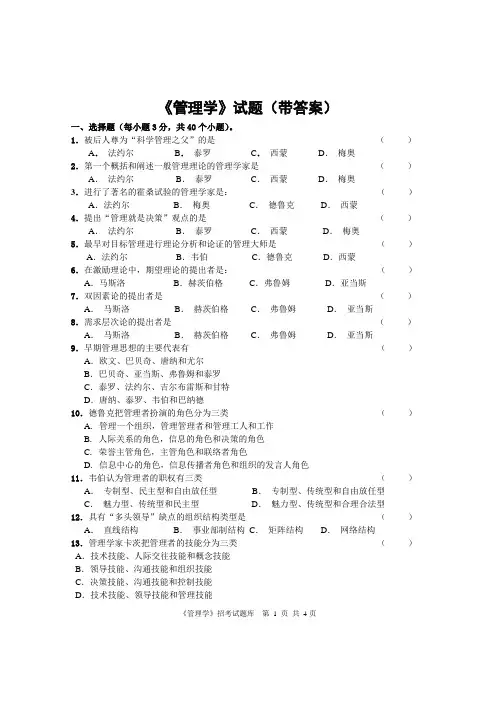
《管理学》试题(带答案)一、选择题(每小题3分,共40个小题)。
1.被后人尊为“科学管理之父”的是()A.法约尔B.泰罗C.西蒙D.梅奥2.第一个概括和阐述一般管理理论的管理学家是()A.法约尔B.泰罗C.西蒙D.梅奥3.进行了著名的霍桑试验的管理学家是:()A.法约尔B.梅奥C.德鲁克D.西蒙4.提出“管理就是决策”观点的是()A.法约尔B.泰罗C.西蒙D.梅奥5.最早对目标管理进行理论分析和论证的管理大师是()A.法约尔B.韦伯C.德鲁克D.西蒙6.在激励理论中,期望理论的提出者是:()A.马斯洛B.赫茨伯格C.弗鲁姆D.亚当斯7.双因素论的提出者是()A.马斯洛B.赫茨伯格C.弗鲁姆D.亚当斯8.需求层次论的提出者是()A.马斯洛B.赫茨伯格C.弗鲁姆D.亚当斯9.早期管理思想的主要代表有()A.欧文、巴贝奇、唐纳和尤尔B.巴贝奇、亚当斯、弗鲁姆和泰罗C.泰罗、法约尔、吉尔布雷斯和甘特D.唐纳、泰罗、韦伯和巴纳德10.德鲁克把管理者扮演的角色分为三类()A.管理一个组织,管理管理者和管理工人和工作B.人际关系的角色,信息的角色和决策的角色C.荣誉主管角色,主管角色和联络者角色D.信息中心的角色,信息传播者角色和组织的发言人角色11.韦伯认为管理者的职权有三类()A.专制型、民主型和自由放任型B.专制型、传统型和自由放任型C.魅力型、传统型和民主型D.魅力型、传统型和合理合法型12.具有“多头领导”缺点的组织结构类型是()A.直线结构B.事业部制结构C.矩阵结构D.网络结构13.管理学家卡茨把管理者的技能分为三类()A.技术技能、人际交往技能和概念技能B.领导技能、沟通技能和组织技能C.决策技能、沟通技能和控制技能D.技术技能、领导技能和管理技能《管理学》招考试题库第1 页共4页14.古典管理理论的局限性主要表现为()A.忽略了对组织中人的因素和外部环境对组织影响的研究B.忽略了对决策理论和激励理论的研究C.忽略了对数学和计算机技术在管理中应用的研究D.忽略了对管理制度与激励机制的研究15.控制的类型按控制的时间顺序可以分为()A.直接控制与间接控制B.预算控制和非预算控制C.前馈控制、现场控制和反馈控制D.比率控制和综合控制16.政策()A.是一种以数字表示预期结果的计划B.是一种针对特定场合和具体情况明确规定允许或不允许采取行动的计划C.是为了实现特殊目标,针对特定课题制定的计划D.是为实现目标而制定的一种规定活动范围的计划17.国际管理人员的三种管理取向是()A.民族中心式管理、多中心式管理和全球式管理B.本土化管理、合资式管理和独资式管理C.独裁式管理、民主式管理和放任式管理D. 国际化管理、本土化管理和跨国化管理18.管理科学理论主要包括()A.运筹学、系统分析和管理信息系统和决策支持系统B.古典管理理论、行为管理理论和数理管理理论C.管理科学理论、古典组织理论和数理管理理论D.权变理论、协作社会系统法和社会技术系统法19.组织结构中所说的指挥权是指:()A.直线职权B.参谋职权C.职能职权D.建议权20.“灵活运用管理理论和技术的技巧和诀窍”指的是:()A.管理的科学性B.管理的社会性C.管理的艺术性D.管理的二重性21.管理者应对环境变化可选择的三种主要方法是()A.适应法、影响法和转移法B.适应法、缓冲法和预测法C.重构法、限量法和预测法D.公关法、合资法和预测法22.根据组织宗旨而提出的组织在一定时期内要达到的预期成果是:()A.政策B.目标C.规则D.宗旨23.当组织的规模一定时,管理层次与管理宽度的关系是:()A.成反比B.成正比C.无关D.不确定24.管理的二重性是指管理的()《管理学》招考试题库第2 页共4页A.科学性和艺术性B.社会属性和自然属性C.一般性和多科性D.理论性和实践性25.社会责任的四个层次是指()A.经济、法律、道德和自愿B.政治、经济、技术和文化C.个人、组织、家庭和国家D.政治、法律、经济和技术26.双因素理论认为,影响人的行为的因素可归结为()A.生理因素和安全因素B.保健因素和生理因素C.安全因素和激励因素D.保健因素和激励因素27.确定目标,预测未来和拟定实现目标行动方案的过程,是管理的()A.计划职能B.组织职能C.领导职能D.控制职能28.在下列计划种类中,对具体场合和具体情况下,允许或不允许采取某种特定行动的规定的是()A.规则B.政策C.程序D.规划29.管理的首要职能是:()A.组织职能B.计划职能C.人事职能D.控制职能30.定期根据环境变化和实际执行情况调整原计划的计划方法是:()A.滚动计划法B.计划-规划-预算法C.网络计划法D.运筹学31.通常所说的“第一线管理人员”指的是:()A.作业人员B.高层管理者C.中层管理者D.基层管理者32.强调“针对不同的情况寻求不同的最合适的管理模式和方法”的理论是:()A.科学管理理论B.决策理论C.权变管理理论D.系统管理理论33.按预测的性质,预测可分为两大类()A.定量预测和定性预测B.宏观预测和微观预测C.政治预测和经济预测D.长期预测和短期预测34.按照计划制定涉及的管理层次,计划可分为以下三种类型()A.战略计划、策略计划和运营计划B.长期计划、中期计划和短期计划C.综合计划,局部计划和项目计划D.指令性计划、指导性计划和混合性计划35.主管人员及下属的能力增强,管理宽度通常可:()A.减小B.不变C.增大D.不确定36.对马斯洛等人的“自我实现的人”假设进行概括,麦格雷戈提出了:()A.Y理论B.X理论C.Z理论D.超Y理论37.霍夫施太德把文化差异作了以下四种分类()《管理学》招考试题库第3 页共4页A.个人主义与集体主义、权力差距、不确定性规避和男性气质和女性气质B.本国文化、东道国文化、全球文化和跨国文化C.强文化、弱文化、长期文化和短期文化D.企业文化、民族文化、强文化与弱文化38.在下列计划种类中,规定了如何处理那些重复发生的例行问题的标准方法的是()A.规则B.政策C.程序D.规划39.对组织内部的管理活动及效果进行衡量和校正,是管理的:()A.计划职能B.组织职能C.人员配备D.控制职能40右图表示的组织结构类型是()A.事业部制B.职能型D.直线型二、简答题(每题10分,共20小题)。
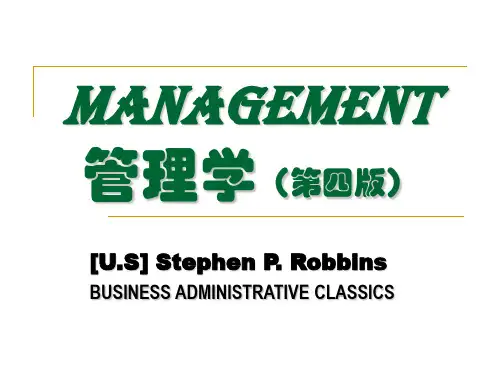
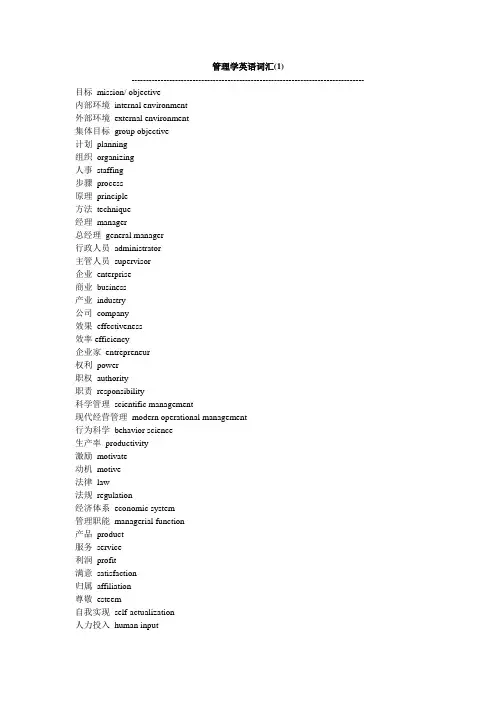
管理学英语词汇(1)-------------------------------------------------------------------------------- 目标mission/ objective内部环境internal environment外部环境external environment集体目标group objective计划planning组织organizing人事staffing步骤process原理principle方法technique经理manager总经理general manager行政人员administrator主管人员supervisor企业enterprise商业business产业industry公司company效果effectiveness效率efficiency企业家entrepreneur权利power职权authority职责responsibility科学管理scientific management现代经营管理modern operational management行为科学behavior science生产率productivity激励motivate动机motive法律law法规regulation经济体系economic system管理职能managerial function产品product服务service利润profit满意satisfaction归属affiliation尊敬esteem自我实现self-actualization人力投入human input盈余surplus收入income成本cost资本货物capital goods机器machinery设备equipment建筑building存货inventory经验法the empirical approach人际行为法the interpersonal behavior approach集体行为法the group behavior approach协作社会系统法the cooperative social systems approach 社会技术系统法the social-technical systems approach 决策理论法the decision theory approach数学法the mathematical approach系统法the systems approach随机制宜法the contingency approach管理任务法the managerial roles approach经营法the operational approach人际关系human relation心理学psychology态度attitude压力pressure冲突conflict招聘recruit鉴定appraisal选拔select培训train报酬compensation授权delegation of authority协调coordinate业绩performance考绩制度merit system表现behavior下级subordinate偏差deviation检验记录inspection record误工记录record of labor-hours lost销售量sales volume产品质量quality of products先进技术advanced technology顾客服务customer service策略strategy结构structure领先性primacy普遍性pervasiveness忧虑fear忿恨resentment士气morale解雇layoff批发wholesale零售retail程序procedure规则rule规划program预算budget共同作用synergy大型联合企业conglomerate资源resource购买acquisition增长目标growth goal专利产品proprietary product竞争对手rival晋升promotion管理决策managerial decision商业道德business ethics有竞争力的价格competitive price供货商supplier小贩vendor利益冲突conflict of interests派生政策derivative policy开支帐户expense account批准程序approval procedure管理学英语词汇(2)-------------------------------------------------------------------------------- 病假sick leave休假vacation工时labor-hour机时machine-hour资本支出capital outlay现金流量cash flow工资率wage rate税收率tax rate股息dividen病假sick leave休假vacation工时labor-hour机时machine-hour资本支出capital outlay现金流量cash flow工资率wage rate税收率tax rate股息dividend现金状况cash position资金短缺capital shortage总预算overall budget资产负债表balance sheet可行性feasibility投入原则the commitment principle 投资回报return on investment生产能力capacity to produce实际工作者practitioner最终结果end result业绩performance个人利益personal interest福利welfare市场占有率market share创新innovation生产率productivity利润率profitability社会责任public responsibility董事会board of director组织规模size of the organization组织文化organizational culture目标管理management by objectives 评价工具appraisal tool激励方法motivational techniques 控制手段control device个人价值personal worth优势strength弱势weakness机会opportunity威胁threat个人责任personal responsibility顾问counselor定量目标quantitative objective定性目标qualitative objective可考核目标verifiable objective优先priority工资表payroll策略strategy政策policy灵活性discretion多种经营diversification评估assessment一致性consistency应变策略consistency strategy公共关系public relation价值value抱负aspiration偏见prejudice审查review批准approval主要决定major decision分公司总经理division general manager资产组合距阵portfolio matrix明星star 问号question mark现金牛cash cow赖狗dog采购procurement人口因素demographic factor地理因素geographic factor公司形象company image产品系列product line合资企业joint venture破产政策liquidation strategy紧缩政策retrenchment strategy战术tactics追随followership管理学英语词汇(3)-------------------------------------------------------------------------------- 个性individuality性格personality安全safety自主权latitude悲观的pessimistic静止的static乐观的optimistic动态的dynamic灵活的fle个性individuality性格personality安全safety自主权latitude静止的static乐观的optimistic动态的dynamic灵活的flexible抵制resistance敌对antagonism折中eclectic激励motivation潜意识subconscious地位status感affection欲望desire压力pressure满足satisfaction自我实现的需要needs for self-actualization 尊敬的需要esteem needs归属的需要affiliation needs安全的需要security needs生理的需要physiological needs维持maintenance保健hygiene激励因素motivator概率probability强化理论reinforcement theory反馈feedback奖金bonus股票期权stock option劳资纠纷labor dispute缺勤率absenteeism人员流动turnover奖励reward特许经营franchise热诚zeal信心confidence鼓舞inspire要素ingredient忠诚loyalty奉献devotion作风style品质trait适应性adaptability进取性aggressiveness热情enthusiasm人际交往能力interpersonal skills行政管理能力administrative ability智力intelligence专制式领导autocratic leader民主式领导democratic leader自由放任式领导free-rein leader管理方格图the managerial grid工作效率work efficiency服从obedience领导行为leader behavior支持型领导supportive leadership参与型领导participative leadership指导型领导instrumental leadership管理学英语词汇(4) 知识管理BBalanced scorecard平衡计分卡CCapability能力Chief knowledge officer(CKO)首席知识管Chief learning officer(CLO) 首席学习管、学习经理Collaboration 协同运作Core competence核心能力Corporate innovation公司(企业)创新Corporate knowledge base公司(企业)知识库Corporate university企业(企业)大学Customer relation management(CRM)客户关系管理DData mining资料挖掘Data warehouse(DW)数据仓库Discussion 讨论区Dicision supporting system(DSS)决策支持系统Digital Nervous System数字神经系统Document Management 文件(文档)管理Ee-learning电子学习、在线学习Enterprise Resource Planning企业资源计划Executive Information System主管支持系统Expert System专家系统Expert Yellow Page 专家黄页Enterprise Information Portal(EIP)企业入口网站Explicit Knowledge显性知识FFunction功能Functional Capability功能能力GGlobal Knowledge Management全球知识管理HHigh-level Learning 高阶学习IInformation Technology 信息科技Information Retrieval信息检索Infrastructure基础建设Innovation Capital创新资本、创新资产Innovation Index 创新指数Innovation Indicator创新指标Intelletual Asset智慧资产Intelletual Capital(IC)智慧资本、智慧资产Intelletual Property智慧财产、智财Intelligence智慧Intelligence Capital智慧资本Internalization内化Islands of Knowledge知识孤岛KKnow How专门技术Knowledge知识Knowledge Access知识存取Knowledge Acquirer知识买方Knowledge Acquisiton知识获取Knowledge Architcture知识基本结构Knowledge Asset知识资产Knowledge Assimilation知识吸收Knowledge Audit知识审计Knowledge Balance Sheet知识资产负债表Knowledge Base知识基础Knowledge-Base Company知识企业Knowledge-Base Economy知识经济Knowledge Base Industry 知识产业Knowledge Map知识地图Knowledge Broker知识中介Knowledge Capability知识能力Knowledge Capital知识资本Knowledge Coach知识教练Knowledge Community知识社区Knowledge Copy知识复制Knowledge Depository知识库Knowledge Discovery知识发现Knowledge Ecology知识生态学Knowledge Economy知识经济Knowledge Enterprise知识企业Knowledge Expense知识费用Knowledge Flow知识流通、知识流量Knowledge Gap知识缺口Knowledge Information Technology知识信息技术Knowledge Internalization知识内化Knowledge Life Cycle知识生产周期Knowledge Management(KM)知识管理Knowledge Management Infrasturcture知识管理基础建设Knowledge Management Process知识管理流程Knowledge Management Strategies知识管理策略Knowledge Management System知识管理系统Knowledge Manager知识管理经理Knowledge Map知识地图Knowledge Mediate知识媒介Knowledge Performance Review知识绩效评估Knowledge Pooling知识汇总Knowledge Spirals 知识螺旋Knowledge Worker 知识工作者LLearning Community学习社区Local Knowledge 当地知识Lower-Level Learning低阶学习MMentoring心智模式Mentoring师徒制Mode of Mind 心智模式NNew Economy 新经济OOrganization Knowledge 组织知识Organizational IQ 公司智商Organizational Learning 组织学习Project Management项目管理Proteges徒弟RReturn On Knowledge 知识报酬率SSearch Engines 搜索引擎Share 分享Software Package 软件包Stakeholder Evaluation 员工评估Strategic Capability 策略能力TTacit Knowledge 隐性知识Technical Innovation 技术创新Think Bank 智库Tool Knowledge 工具知识UUulearning 反学习VValue Innovation 价值创新Vertical Collaborationa 垂直整合Virtual Community 虚拟社群Virtual Organization 虚拟组织。

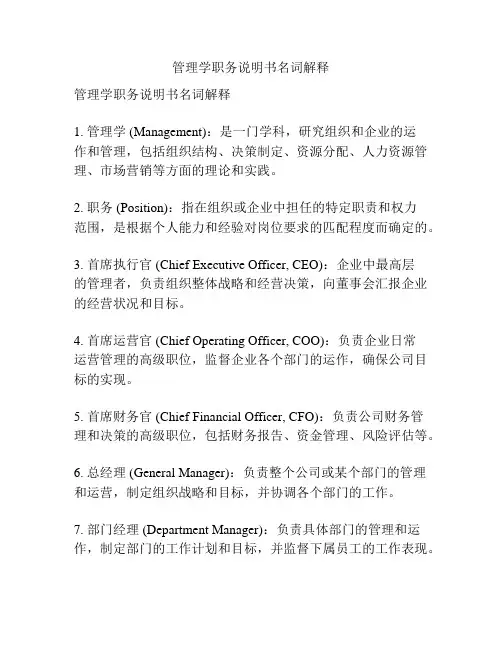
管理学职务说明书名词解释管理学职务说明书名词解释1. 管理学 (Management):是一门学科,研究组织和企业的运作和管理,包括组织结构、决策制定、资源分配、人力资源管理、市场营销等方面的理论和实践。
2. 职务 (Position):指在组织或企业中担任的特定职责和权力范围,是根据个人能力和经验对岗位要求的匹配程度而确定的。
3. 首席执行官 (Chief Executive Officer, CEO):企业中最高层的管理者,负责组织整体战略和经营决策,向董事会汇报企业的经营状况和目标。
4. 首席运营官 (Chief Operating Officer, COO):负责企业日常运营管理的高级职位,监督企业各个部门的运作,确保公司目标的实现。
5. 首席财务官 (Chief Financial Officer, CFO):负责公司财务管理和决策的高级职位,包括财务报告、资金管理、风险评估等。
6. 总经理 (General Manager):负责整个公司或某个部门的管理和运营,制定组织战略和目标,并协调各个部门的工作。
7. 部门经理 (Department Manager):负责具体部门的管理和运作,制定部门的工作计划和目标,并监督下属员工的工作表现。
8. 项目经理(Project Manager):负责项目的规划、执行和控制,协调资源、时间和成本,确保项目按时完成和达到预期目标。
9. 人力资源经理 (Human Resources Manager):负责企业的人力资源规划、招聘、福利管理、培训和绩效评估等工作。
10. 销售经理 (Sales Manager):负责销售团队的管理和业绩目标的实现,制定销售策略,开拓新客户和维护现有客户关系。
11. 市场营销经理 (Marketing Manager):负责市场调研、品牌推广、市场营销策略制定和执行,以及产品定价和销售渠道的管理。
12. 供应链经理 (Supply Chain Manager):负责整个供应链的运作和管理,包括采购、仓储、物流和供应商管理,确保产品供应的高效和及时。

管理英语4管理英语4第⼀单元Five Basic Functions That Make up the Management Process构成管理过程的五个基本功能In 1916, a French coal mine director named Henri Fayol wrote a book entitled Administration Industrielle et Generale, which set forth five distinct functions of managing that Fayol insisted were applicable in any industry. ts on interior structure of tourism. In the 1950's, management textbooks began to incorporate some of Fayol's ideas into their content, and today, management courses still use many of his ideas to teach management to business students.1916年,法国煤矿公司总经理亨利·法约尔写了⼀本名为《⼯业管理与⼀般管理》的书,书中提出了五种独特的管理职能,并强调这些管理职能适⽤于任何⾏业。
20世纪50年代,管理学教科书开始编⼊法约尔的理念,时⾄今⽇,管理学课程依然向商科学⽣传授他的思想。
Planning involves deciding where to take a company and selecting steps to get there. It first requires managers to be aware of challenges facing their businesses, and then it requires managers to forecast future business and economic conditions. They then formulate objectives to reach by certain deadlines and decide on steps to reach them. They re-evaluate their plans as conditions change and make adjustments as necessary.规划包括确定公司的发展⽅向,并选择实现⽬标的各个步骤。
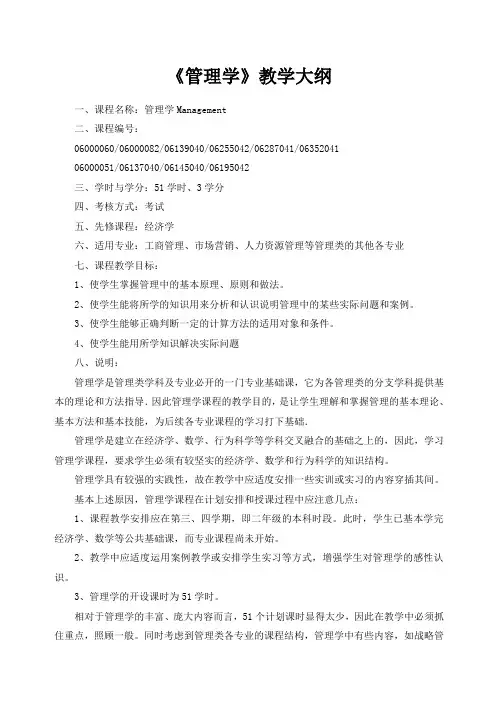
《管理学》教学大纲一、课程名称:管理学Management二、课程编号:06000060/06000082/06139040/06255042/06287041/0635204106000051/06137040/06145040/06195042三、学时与学分:51学时、3学分四、考核方式:考试五、先修课程:经济学六、适用专业:工商管理、市场营销、人力资源管理等管理类的其他各专业七、课程教学目标:1、使学生掌握管理中的基本原理、原则和做法。
2、使学生能将所学的知识用来分析和认识说明管理中的某些实际问题和案例。
3、使学生能够正确判断一定的计算方法的适用对象和条件。
4、使学生能用所学知识解决实际问题八、说明:管理学是管理类学科及专业必开的一门专业基础课,它为各管理类的分支学科提供基本的理论和方法指导.因此管理学课程的教学目的,是让学生理解和掌握管理的基本理论、基本方法和基本技能,为后续各专业课程的学习打下基础.管理学是建立在经济学、数学、行为科学等学科交叉融合的基础之上的,因此,学习管理学课程,要求学生必须有较坚实的经济学、数学和行为科学的知识结构。
管理学具有较强的实践性,故在教学中应适度安排一些实训或实习的内容穿插其间。
基本上述原因,管理学课程在计划安排和授课过程中应注意几点:1、课程教学安排应在第三、四学期,即二年级的本科时段。
此时,学生已基本学完经济学、数学等公共基础课,而专业课程尚未开始。
2、教学中应适度运用案例教学或安排学生实习等方式,增强学生对管理学的感性认识。
3、管理学的开设课时为51学时。
相对于管理学的丰富、庞大内容而言,51个计划课时显得太少,因此在教学中必须抓住重点,照顾一般。
同时考虑到管理类各专业的课程结构,管理学中有些内容,如战略管理,人力资源管理等已在有些专业成为专门的课程,故在教学中,凡可能与其它课程重复的内容一般少讲或不讲。
4、本大纲作为教学、考试的依据。
为充分发挥广大师生在教学中的灵活性、创造性,本大纲的规定是粗线条的,教师在授课过程中在遵循本大纲基本内容的前提下,可灵活发挥,甚至可超出大纲的内容,讲课的章节顺序也可灵活调整,但考试必须以本大纲为依据,统一命题,统一阅卷。
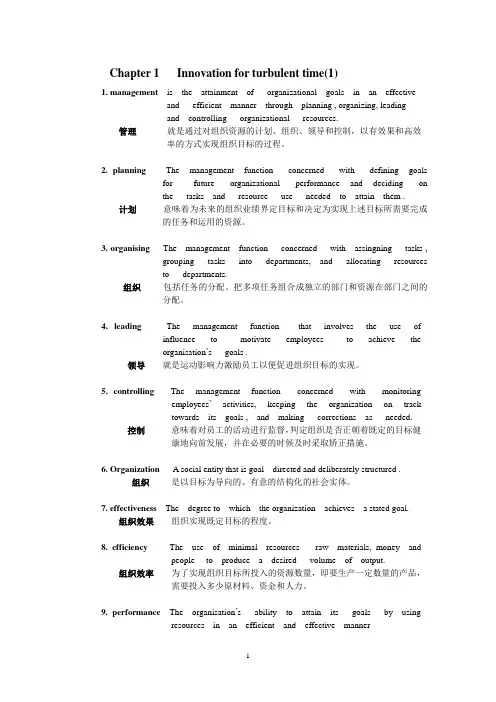
Chapter 1 Innovation for turbulent time(1)1. management is the attainment of organizational goals in an effectiveand efficient manner through planning , organizing, leadingand controlling organizational resources.管理就是通过对组织资源的计划、组织、领导和控制,以有效果和高效率的方式实现组织目标的过程。
2. planning The management function concerned with defining goalsfor future organizational performance and deciding onthe tasks and resource use needed to attain them .计划意味着为未来的组织业绩界定目标和决定为实现上述目标所需要完成的任务和运用的资源。
3. organising The management function concerned with assingning tasks ,grouping tasks into departments, and allocating resourcesto departments.组织包括任务的分配、把多项任务组合成独立的部门和资源在部门之间的分配。
4. leading The management function that involves the use ofinfluence to motivate employees to achieve theorganisation‟s goals .领导就是运动影响力激励员工以便促进组织目标的实现。
5. controlling The management function concerned with monitoringemployees‟activities, keeping the organization on tracktowards its goals , and making corrections as needed.控制意味着对员工的活动进行监督,判定组织是否正朝着既定的目标健康地向前发展,并在必要的时候及时采取矫正措施。
第Ⅰ篇管理导论第1章工作场所的管理者1.1知识结构导图【名师点拨】本章是全书的基础,需要重点理解管理、管理者的概念;掌握管理者的类型,管理的四大职能以及管理技能的内容;了解影响管理者工作的因素,以及作为一名管理者的好处和挑战。
1.2考点难点归纳考点一:管理者的重要性★★管理者对组织非常重要,原因有三:(1)在不确定、复杂和混乱的时期,组织比以往更加需要管理者的管理技能。
当组织应对当今的挑战时,管理者在识别关键问题和巧妙回应上发挥着重要作用。
(2)管理者是组织完成任务的关键。
他们是带领公司走向未来的重要人物。
(3)管理者对员工生产率和忠诚度有贡献。
员工和直接上级的关系质量是决定员工生产率和忠诚度的最重要因素。
员工被管理的方式可以影响到组织的财务绩效。
研究证明,管理能力对于创造组织价值很重要。
考点二:管理者的含义、类型及工作场所★★★★1.管理者的含义管理者(manager)是协调和监管其他人的工作,以使组织目标能够实现的人。
管理者需要协调部门群体的工作,或者监管某个人,还可能需要协调不同部门人员的工作活动,甚至组织外部人员的活动。
2.管理者的类型在传统结构(多为金字塔型)的组织中,管理者包括基层、中层和高层三类,见表1-1。
在结构松散的组织中,管理者可能不容易被识别出来,尽管有人必须担任管理者的角色。
表1-1传统组织中的管理层级3.管理者的工作场所管理者在组织中工作。
组织(organization)是指为了实现某个特定目的而对人员的精心安排。
所有的组织都具有三种共同特征:有明确的目标、由人组成、有精密的结构。
现在很多组织的结构变得更加开放、灵活和适应变化。
考点三:管理的含义、职能、角色和技能★★★★★1.管理的含义管理(management)是指协调和监管他人的工作活动,从而使他们的工作可以有效率且有成效地完成。
协调和监管别人的工作是区别管理职位和非管理职位的特征。
(1)效率(efficiency)是指以尽可能少的投入或资源获得尽可能多的产出。
五大基本职能(计划、组织、领导、决策和控制)计划、决策、组织、领导、激励、沟通、控制、组织文化第一篇基础篇第一章管理与管理学(3课时)第二章管理思想的演变(4课时)第三章管理与环境(2课时)第二篇计划篇第五章目标与决策(3课时)第五章计划及其制定(2课时)第三篇组织篇第六章组织结构的设计(3课时)第七章人员的配备与权力分配(3课时)第四篇领导篇第八章领导理论(4课时)第九章沟通方法(3课时)第十章激励原理(4课时)第五篇控制篇第十一章控制与控制方法(3课时)《管理学基础》教学大纲传媒管理系吴红一、课程的描述«管理学基础»是管理类各专业的一门专业基础课程。
本课程主要讲述管理学概论(概念、原理、组织文化等)、管理学的发展史及主流的理论和代表性观点,管理的五大基本职能(计划、组织、领导、决策和控制)等内容,是理论性与实践性较强的专业基础课程。
计划、决策、组织、领导、激励、沟通、控制、组织文化二、课程的教学目标本课程的教学目标是:通过课堂理论学习、技能训练和社会实践活动,使学生掌握管理学基本原理、工具和方法,树立现代管理的思想观念,培养管理者的素质,懂得运用管理学的基本原理、工具、方法和过程进行管理实践,为后续专业课程的学习和成为一名“运营基层管理人”打好基础。
三、课程教学内容“一个原点、三个维度的管理学场”的课程内容体系结构一个原点:管理学的公理性概念。
包括:管理定义、管理角色、管理决策、组织环境和管理伦理、组织文化。
通过公理性概念的导入,使学生建立起管理学的基本概念,成为学习的基点。
三个维度:时间维度:从管理史严格的视角展开管理学的学习,从泰罗制一直到学习型组织理论,沿着时间轨迹鉴赏百年来现代管理学的主要理论和流派的观点、内容,产生的背景和现实意义,使学生建立起“管理学的时间隧道”。
职能维度:从管理职能和管理活动内容的视角,建立起管理学的工作内容与工作方法的空间体系框架,使学生掌握计划、组织、领导和控制的具体方法。
经管院[2010]4号重庆大学经济与工商管理学院关于教师发表学术论文奖励办法(修订版)一、教师申请论文报奖时,由申请者凭论文原件和复印件(包括期刊或论文集封面、目录和文章首页,并在封面上注明申请者姓名)一份,在科研秘书处填写申请表,提出论文发表奖励申请。
二、教师发表的学术论文将依据其登载期刊的类别分别予以不同奖励(税前奖励金额):1.中文A类经济管理期刊以学院认定的17种刊物为准,A类期刊中的《经济研究》、《中国社会科学》为10000元/篇,《管理世界》、《管理科学学报》为6000元/篇;A类期刊中的其它期刊为3000元/篇。
英文SCI、SSCI经济管理期刊中,A+类---40000/篇,A类---20000/篇,B类---10000/篇,C类---6000/篇(包括除英文SCI、SSCI经济管理期刊中的A+类、A类和B类以外的其它英文SCI、SSCI经济管理期刊论文,以及英文EI核心版期刊论文);中文B类经济管理期刊以CSSCI、CSCD收录为准(均不包括扩展版),800元/篇。
2.各类学术期刊增刊、专刊或专辑上发表的论文不予奖励,各类学术期刊上发表的短文减半奖励。
中文A类和英文SCI、SSCI经济管理期刊中的A+类、A类和B类学术期刊名录见附件。
3.发表中文期刊论文,第一作者为教师本人,或第一作者为教师本人指导的研究生而第二作者为教师本人,而且作者单位是重庆大学经管学院;发表英文期刊论文,第一作者为教师本人,或通讯作者(至少应是第二作者)为教师本人,而且作者单位是重庆大学经管学院。
4.发表在国内期刊英文版上的学术论文,视同国内同类期刊中文版上的学术论文对待。
5.国际、国内会议论文不予奖励。
三、以上论文奖励办法自2010年1月1日起执行。
四、本次修订的奖励办法若与原有的奖励办法出现冲突,以本奖励办法为准。
重庆大学经济与工商管理学院2010年2月25日附件:重庆大学经济与工商管理学院中文权威及A类学术期刊权威学术期刊:经济研究中国社会科学管理世界管理科学学报A类学术期刊:金融研究会计研究经济科学经济学动态统计研究中国管理科学系统工程理论与实践中国软科学世界经济科研管理系统工程学报数量经济技术经济研究管理工程学报重庆大学经济与工商管理学院经济管理类SCI/SSCI英文国际学术期刊论文奖励分类目录(试行)A+类A类B类。
罗宾斯《管理学》内容概要,中英⽂对照罗宾斯《管理学》内容概要第⼀篇导论1章管理者和管理1、组织组织(organization)的定义:对完成特定使命的⼈们的系统性安排组织的层次:操作者(operatives)和管理者(基层、中层、⾼层)2、管理者和管理管理者(managers)的定义:指挥别⼈活动的⼈管理(management)的定义:同别⼈⼀起或者通过别⼈使活动完成得更有效的过程。
管理追求效率(efficiency)和效果(effectiveness)管理职能(management functions):计划(planning)、组织(organizing)、领导(leading)、控制(controlling)管理者⾓⾊(management roles):⼈际关系⾓⾊(interpersonal roles)、信息⾓⾊(information roles)、决策⾓⾊(decision roles)成功的管理者和有效的管理者并不等同,在活动时间上,有效的管理者花费了⼤量的时间⽤于沟通,⽽⽹络联系(社交等)占据了成功的管理者很⼤部分时间。
管理者在不同的组织中进⾏着不同的⼯作。
组织的国别、组织的类型、组织的规模以及管理者在组织中的不同层次决定了管理者的⾓⾊扮演、⼯作内容以及职能和作⽤。
2章管理的演进1、20世纪以前的管理:亚当·斯密的劳动分⼯理论(division of labor)产业⾰命(industrial revolution)2、多样化时期(20世纪):科学管理(scientific management):弗雷德⾥克·泰勒⼀般⾏政管理理论(general administrative theory):亨利·法约尔(principles of management)、马克斯·韦伯(bureaucracy)⼈⼒资源⽅法(human resources approach):权威的接受观点(acceptance view of authority),霍桑研究,⼈际关系运动(卡内基、马斯洛),⾏为科学理论家(behavioral science theorists)定量⽅法(quantitative approach)3、近年来的趋势(20世纪后期):趋向⼀体化过程⽅法(process approach)系统⽅法(systems approach):封闭系统和开放系统(closed systems)权变⽅法(contingency approach):⼀般性的权变变量包括组织规模、任务技术的例常性、环境的不确定性、个⼈差异4、当前的趋势和问题(21世纪):变化中的管理实践全球化(globalization)⼯作⼈员多样化(work force diversity)道德(morality)激励创新(innovations)和变⾰(changes)全⾯质量管理(total quality management, TQM):由顾客需要和期望驱动的管理哲学授权(delegation)⼯作⼈员的两极化(bi-modal work force)3章组织⽂化与环境:管理的约束⼒量1、组织组织⽂化(organizational culture)被⽤来指共有的价值体系。